Strategic HRM, Balanced Scorecard & Unilever Organizational Capability
VerifiedAdded on 2023/06/17
|9
|2562
|217
Essay
AI Summary
This essay provides a comprehensive analysis of Strategic Human Resource Management (SHRM) within Unilever, a British multinational consumer goods company. It explores the role of SHRM, including the application of a balanced scorecard to assess business performance from consumer, internal, financial, and growth perspectives. The report examines how HRM strategies, such as human capital management, talent management, and knowledge management, relate to broader management strategies and contribute to organizational capability and performance. It emphasizes the importance of aligning HR practices with business objectives to enhance employee engagement, improve organizational effectiveness, and drive long-term business success for Unilever. The balanced scorecard is used to evaluate and monitor Unilever's business performance, providing insights into its current position and future decision-making.
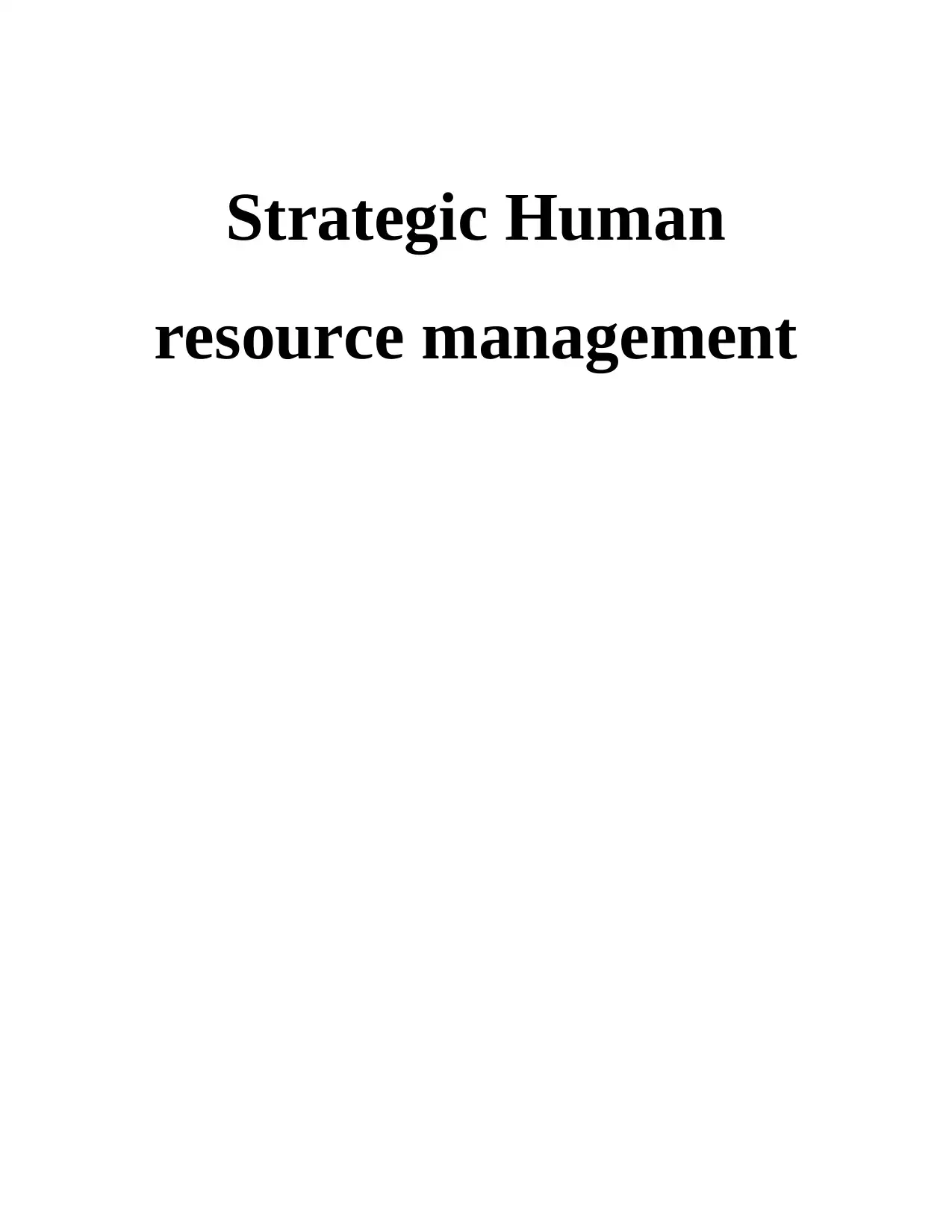
Strategic Human
resource management
resource management
Paraphrase This Document
Need a fresh take? Get an instant paraphrase of this document with our AI Paraphraser
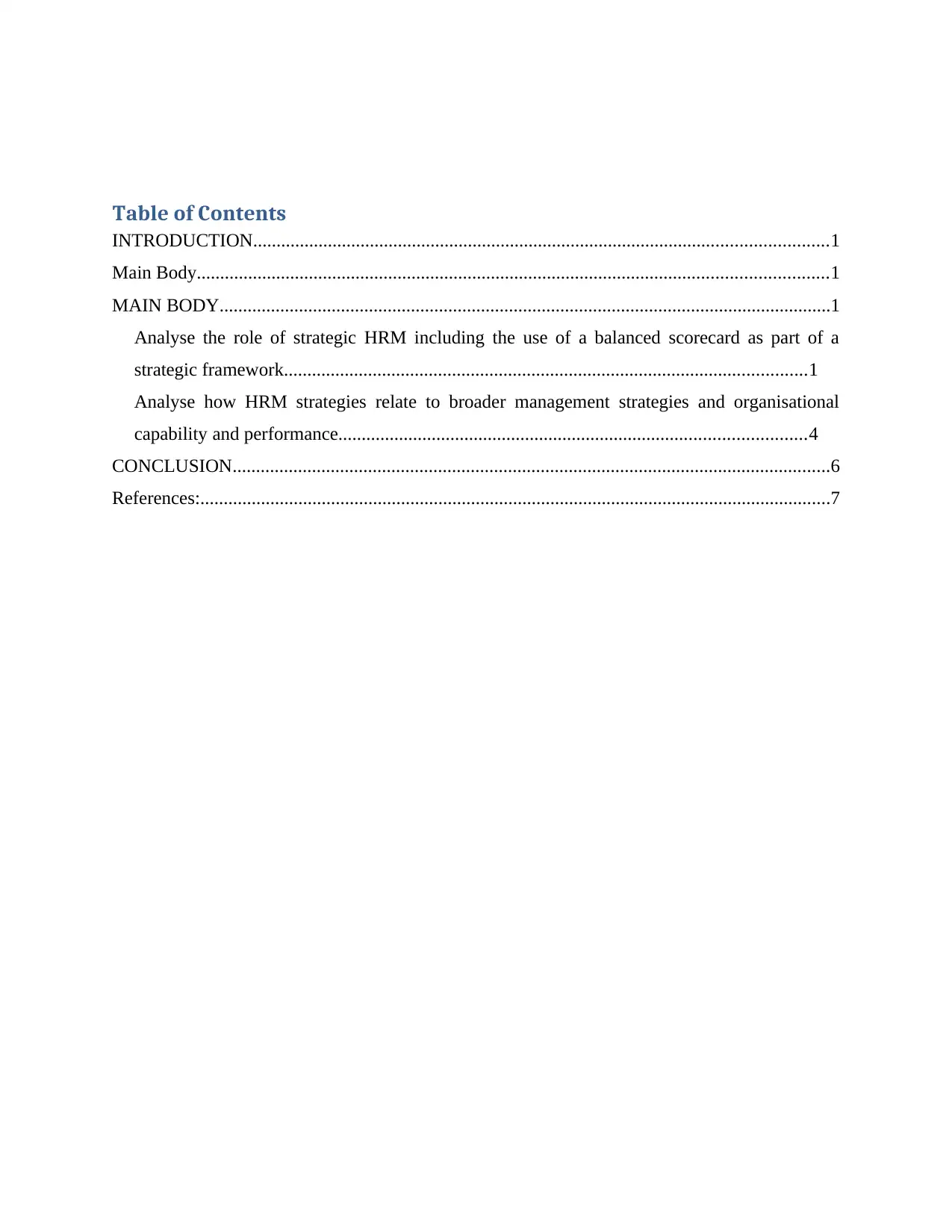
Table of Contents
INTRODUCTION...........................................................................................................................1
Main Body.......................................................................................................................................1
MAIN BODY...................................................................................................................................1
Analyse the role of strategic HRM including the use of a balanced scorecard as part of a
strategic framework................................................................................................................1
Analyse how HRM strategies relate to broader management strategies and organisational
capability and performance....................................................................................................4
CONCLUSION................................................................................................................................6
References:.......................................................................................................................................7
INTRODUCTION...........................................................................................................................1
Main Body.......................................................................................................................................1
MAIN BODY...................................................................................................................................1
Analyse the role of strategic HRM including the use of a balanced scorecard as part of a
strategic framework................................................................................................................1
Analyse how HRM strategies relate to broader management strategies and organisational
capability and performance....................................................................................................4
CONCLUSION................................................................................................................................6
References:.......................................................................................................................................7
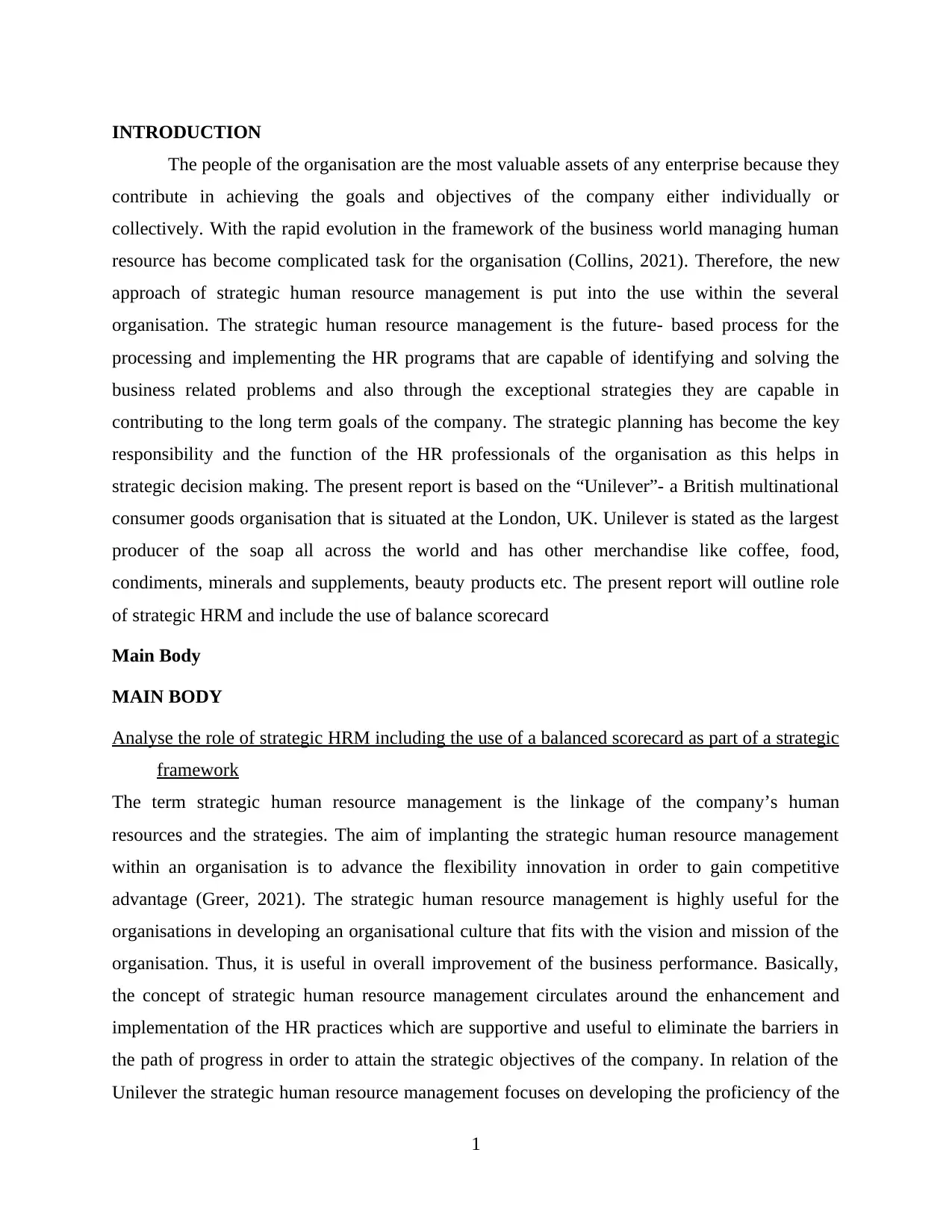
INTRODUCTION
The people of the organisation are the most valuable assets of any enterprise because they
contribute in achieving the goals and objectives of the company either individually or
collectively. With the rapid evolution in the framework of the business world managing human
resource has become complicated task for the organisation (Collins, 2021). Therefore, the new
approach of strategic human resource management is put into the use within the several
organisation. The strategic human resource management is the future- based process for the
processing and implementing the HR programs that are capable of identifying and solving the
business related problems and also through the exceptional strategies they are capable in
contributing to the long term goals of the company. The strategic planning has become the key
responsibility and the function of the HR professionals of the organisation as this helps in
strategic decision making. The present report is based on the “Unilever”- a British multinational
consumer goods organisation that is situated at the London, UK. Unilever is stated as the largest
producer of the soap all across the world and has other merchandise like coffee, food,
condiments, minerals and supplements, beauty products etc. The present report will outline role
of strategic HRM and include the use of balance scorecard
Main Body
MAIN BODY
Analyse the role of strategic HRM including the use of a balanced scorecard as part of a strategic
framework
The term strategic human resource management is the linkage of the company’s human
resources and the strategies. The aim of implanting the strategic human resource management
within an organisation is to advance the flexibility innovation in order to gain competitive
advantage (Greer, 2021). The strategic human resource management is highly useful for the
organisations in developing an organisational culture that fits with the vision and mission of the
organisation. Thus, it is useful in overall improvement of the business performance. Basically,
the concept of strategic human resource management circulates around the enhancement and
implementation of the HR practices which are supportive and useful to eliminate the barriers in
the path of progress in order to attain the strategic objectives of the company. In relation of the
Unilever the strategic human resource management focuses on developing the proficiency of the
1
The people of the organisation are the most valuable assets of any enterprise because they
contribute in achieving the goals and objectives of the company either individually or
collectively. With the rapid evolution in the framework of the business world managing human
resource has become complicated task for the organisation (Collins, 2021). Therefore, the new
approach of strategic human resource management is put into the use within the several
organisation. The strategic human resource management is the future- based process for the
processing and implementing the HR programs that are capable of identifying and solving the
business related problems and also through the exceptional strategies they are capable in
contributing to the long term goals of the company. The strategic planning has become the key
responsibility and the function of the HR professionals of the organisation as this helps in
strategic decision making. The present report is based on the “Unilever”- a British multinational
consumer goods organisation that is situated at the London, UK. Unilever is stated as the largest
producer of the soap all across the world and has other merchandise like coffee, food,
condiments, minerals and supplements, beauty products etc. The present report will outline role
of strategic HRM and include the use of balance scorecard
Main Body
MAIN BODY
Analyse the role of strategic HRM including the use of a balanced scorecard as part of a strategic
framework
The term strategic human resource management is the linkage of the company’s human
resources and the strategies. The aim of implanting the strategic human resource management
within an organisation is to advance the flexibility innovation in order to gain competitive
advantage (Greer, 2021). The strategic human resource management is highly useful for the
organisations in developing an organisational culture that fits with the vision and mission of the
organisation. Thus, it is useful in overall improvement of the business performance. Basically,
the concept of strategic human resource management circulates around the enhancement and
implementation of the HR practices which are supportive and useful to eliminate the barriers in
the path of progress in order to attain the strategic objectives of the company. In relation of the
Unilever the strategic human resource management focuses on developing the proficiency of the
1
⊘ This is a preview!⊘
Do you want full access?
Subscribe today to unlock all pages.

Trusted by 1+ million students worldwide
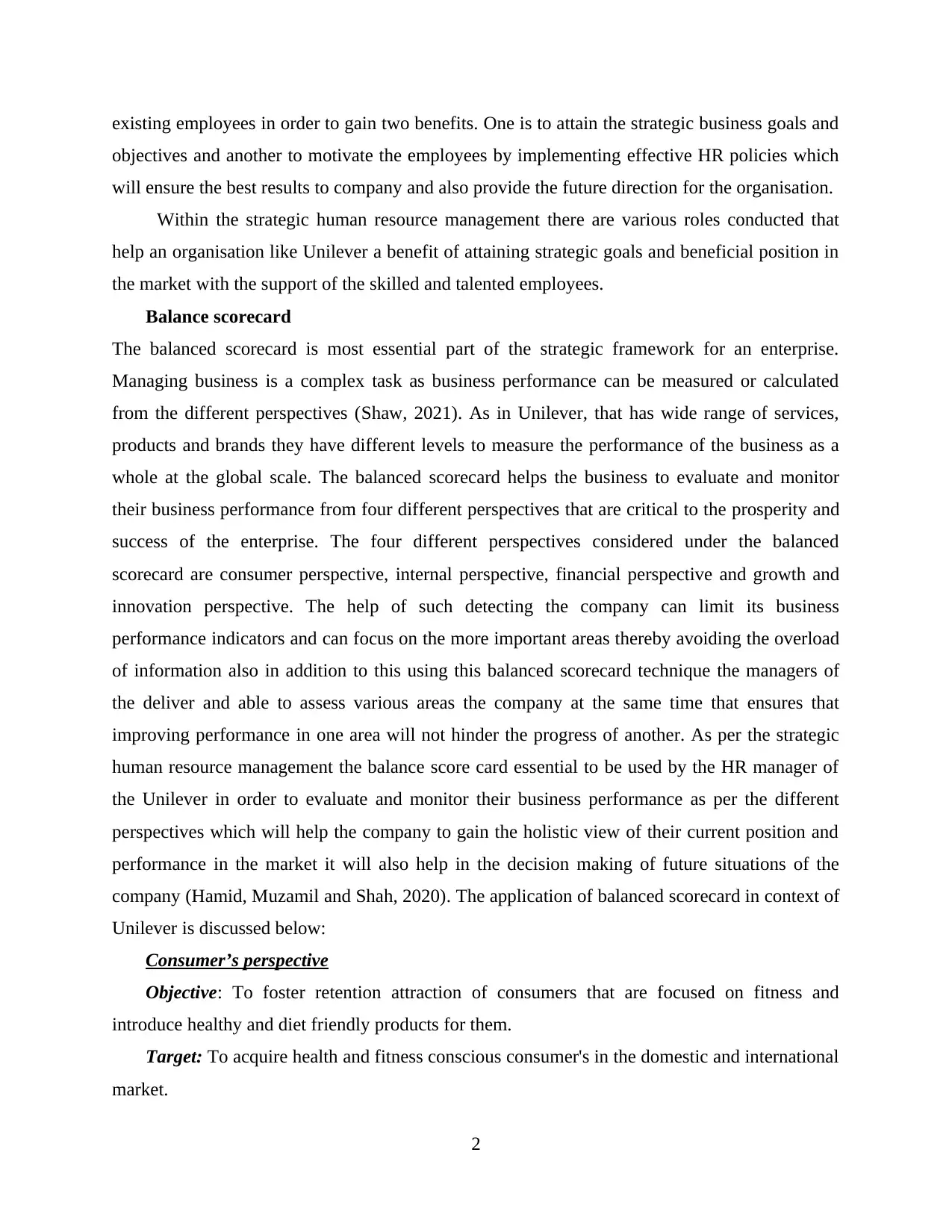
existing employees in order to gain two benefits. One is to attain the strategic business goals and
objectives and another to motivate the employees by implementing effective HR policies which
will ensure the best results to company and also provide the future direction for the organisation.
Within the strategic human resource management there are various roles conducted that
help an organisation like Unilever a benefit of attaining strategic goals and beneficial position in
the market with the support of the skilled and talented employees.
Balance scorecard
The balanced scorecard is most essential part of the strategic framework for an enterprise.
Managing business is a complex task as business performance can be measured or calculated
from the different perspectives (Shaw, 2021). As in Unilever, that has wide range of services,
products and brands they have different levels to measure the performance of the business as a
whole at the global scale. The balanced scorecard helps the business to evaluate and monitor
their business performance from four different perspectives that are critical to the prosperity and
success of the enterprise. The four different perspectives considered under the balanced
scorecard are consumer perspective, internal perspective, financial perspective and growth and
innovation perspective. The help of such detecting the company can limit its business
performance indicators and can focus on the more important areas thereby avoiding the overload
of information also in addition to this using this balanced scorecard technique the managers of
the deliver and able to assess various areas the company at the same time that ensures that
improving performance in one area will not hinder the progress of another. As per the strategic
human resource management the balance score card essential to be used by the HR manager of
the Unilever in order to evaluate and monitor their business performance as per the different
perspectives which will help the company to gain the holistic view of their current position and
performance in the market it will also help in the decision making of future situations of the
company (Hamid, Muzamil and Shah, 2020). The application of balanced scorecard in context of
Unilever is discussed below:
Consumer’s perspective
Objective: To foster retention attraction of consumers that are focused on fitness and
introduce healthy and diet friendly products for them.
Target: To acquire health and fitness conscious consumer's in the domestic and international
market.
2
objectives and another to motivate the employees by implementing effective HR policies which
will ensure the best results to company and also provide the future direction for the organisation.
Within the strategic human resource management there are various roles conducted that
help an organisation like Unilever a benefit of attaining strategic goals and beneficial position in
the market with the support of the skilled and talented employees.
Balance scorecard
The balanced scorecard is most essential part of the strategic framework for an enterprise.
Managing business is a complex task as business performance can be measured or calculated
from the different perspectives (Shaw, 2021). As in Unilever, that has wide range of services,
products and brands they have different levels to measure the performance of the business as a
whole at the global scale. The balanced scorecard helps the business to evaluate and monitor
their business performance from four different perspectives that are critical to the prosperity and
success of the enterprise. The four different perspectives considered under the balanced
scorecard are consumer perspective, internal perspective, financial perspective and growth and
innovation perspective. The help of such detecting the company can limit its business
performance indicators and can focus on the more important areas thereby avoiding the overload
of information also in addition to this using this balanced scorecard technique the managers of
the deliver and able to assess various areas the company at the same time that ensures that
improving performance in one area will not hinder the progress of another. As per the strategic
human resource management the balance score card essential to be used by the HR manager of
the Unilever in order to evaluate and monitor their business performance as per the different
perspectives which will help the company to gain the holistic view of their current position and
performance in the market it will also help in the decision making of future situations of the
company (Hamid, Muzamil and Shah, 2020). The application of balanced scorecard in context of
Unilever is discussed below:
Consumer’s perspective
Objective: To foster retention attraction of consumers that are focused on fitness and
introduce healthy and diet friendly products for them.
Target: To acquire health and fitness conscious consumer's in the domestic and international
market.
2
Paraphrase This Document
Need a fresh take? Get an instant paraphrase of this document with our AI Paraphraser
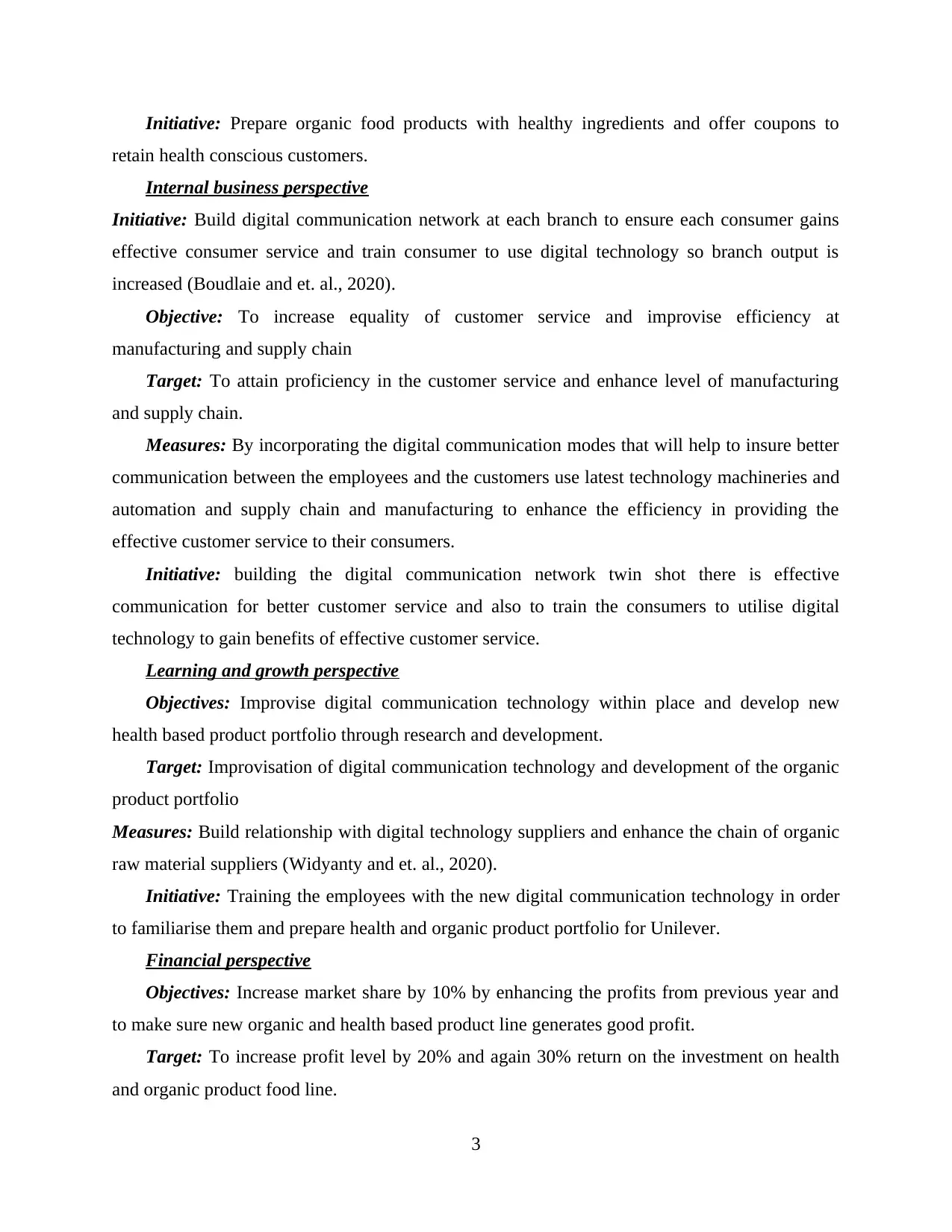
Initiative: Prepare organic food products with healthy ingredients and offer coupons to
retain health conscious customers.
Internal business perspective
Initiative: Build digital communication network at each branch to ensure each consumer gains
effective consumer service and train consumer to use digital technology so branch output is
increased (Boudlaie and et. al., 2020).
Objective: To increase equality of customer service and improvise efficiency at
manufacturing and supply chain
Target: To attain proficiency in the customer service and enhance level of manufacturing
and supply chain.
Measures: By incorporating the digital communication modes that will help to insure better
communication between the employees and the customers use latest technology machineries and
automation and supply chain and manufacturing to enhance the efficiency in providing the
effective customer service to their consumers.
Initiative: building the digital communication network twin shot there is effective
communication for better customer service and also to train the consumers to utilise digital
technology to gain benefits of effective customer service.
Learning and growth perspective
Objectives: Improvise digital communication technology within place and develop new
health based product portfolio through research and development.
Target: Improvisation of digital communication technology and development of the organic
product portfolio
Measures: Build relationship with digital technology suppliers and enhance the chain of organic
raw material suppliers (Widyanty and et. al., 2020).
Initiative: Training the employees with the new digital communication technology in order
to familiarise them and prepare health and organic product portfolio for Unilever.
Financial perspective
Objectives: Increase market share by 10% by enhancing the profits from previous year and
to make sure new organic and health based product line generates good profit.
Target: To increase profit level by 20% and again 30% return on the investment on health
and organic product food line.
3
retain health conscious customers.
Internal business perspective
Initiative: Build digital communication network at each branch to ensure each consumer gains
effective consumer service and train consumer to use digital technology so branch output is
increased (Boudlaie and et. al., 2020).
Objective: To increase equality of customer service and improvise efficiency at
manufacturing and supply chain
Target: To attain proficiency in the customer service and enhance level of manufacturing
and supply chain.
Measures: By incorporating the digital communication modes that will help to insure better
communication between the employees and the customers use latest technology machineries and
automation and supply chain and manufacturing to enhance the efficiency in providing the
effective customer service to their consumers.
Initiative: building the digital communication network twin shot there is effective
communication for better customer service and also to train the consumers to utilise digital
technology to gain benefits of effective customer service.
Learning and growth perspective
Objectives: Improvise digital communication technology within place and develop new
health based product portfolio through research and development.
Target: Improvisation of digital communication technology and development of the organic
product portfolio
Measures: Build relationship with digital technology suppliers and enhance the chain of organic
raw material suppliers (Widyanty and et. al., 2020).
Initiative: Training the employees with the new digital communication technology in order
to familiarise them and prepare health and organic product portfolio for Unilever.
Financial perspective
Objectives: Increase market share by 10% by enhancing the profits from previous year and
to make sure new organic and health based product line generates good profit.
Target: To increase profit level by 20% and again 30% return on the investment on health
and organic product food line.
3
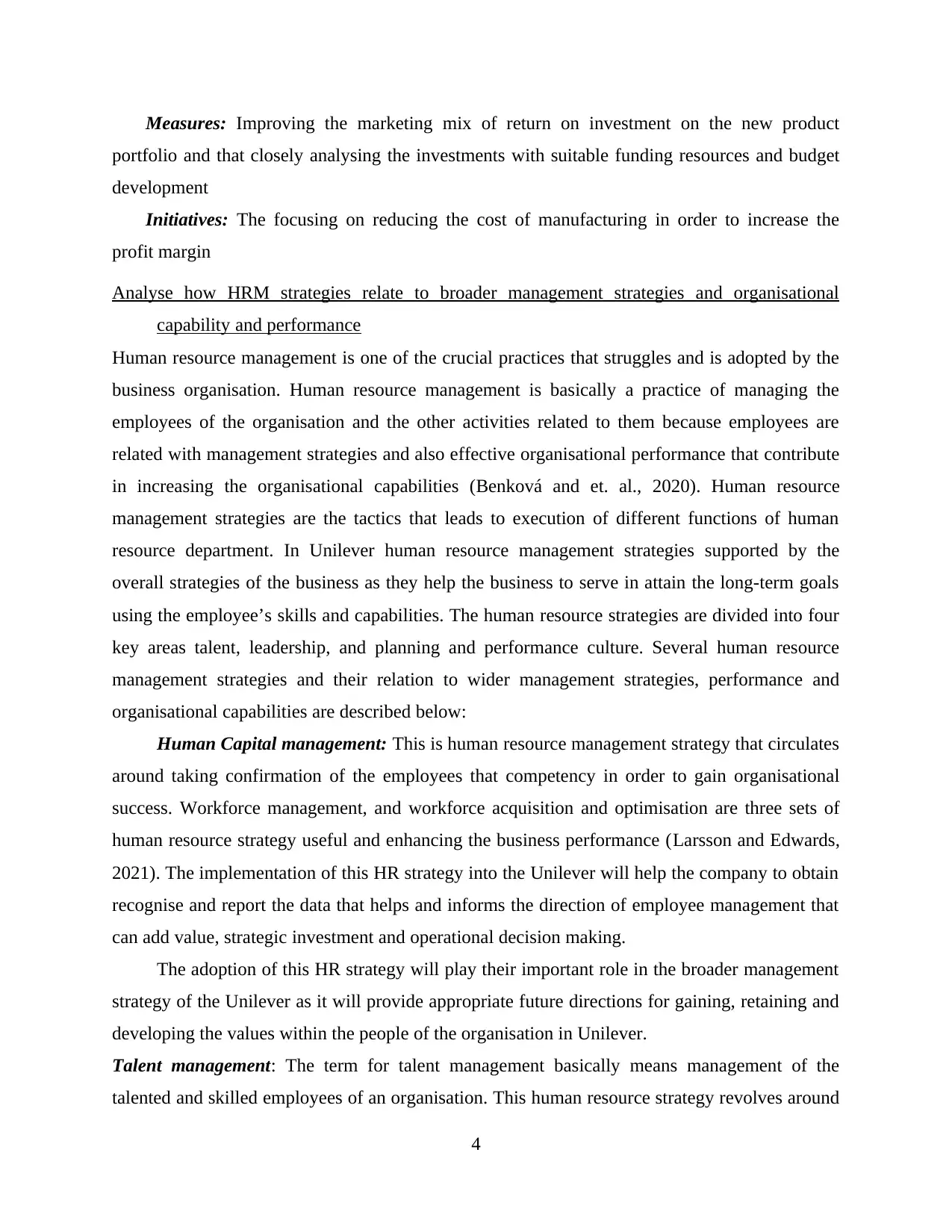
Measures: Improving the marketing mix of return on investment on the new product
portfolio and that closely analysing the investments with suitable funding resources and budget
development
Initiatives: The focusing on reducing the cost of manufacturing in order to increase the
profit margin
Analyse how HRM strategies relate to broader management strategies and organisational
capability and performance
Human resource management is one of the crucial practices that struggles and is adopted by the
business organisation. Human resource management is basically a practice of managing the
employees of the organisation and the other activities related to them because employees are
related with management strategies and also effective organisational performance that contribute
in increasing the organisational capabilities (Benková and et. al., 2020). Human resource
management strategies are the tactics that leads to execution of different functions of human
resource department. In Unilever human resource management strategies supported by the
overall strategies of the business as they help the business to serve in attain the long-term goals
using the employee’s skills and capabilities. The human resource strategies are divided into four
key areas talent, leadership, and planning and performance culture. Several human resource
management strategies and their relation to wider management strategies, performance and
organisational capabilities are described below:
Human Capital management: This is human resource management strategy that circulates
around taking confirmation of the employees that competency in order to gain organisational
success. Workforce management, and workforce acquisition and optimisation are three sets of
human resource strategy useful and enhancing the business performance (Larsson and Edwards,
2021). The implementation of this HR strategy into the Unilever will help the company to obtain
recognise and report the data that helps and informs the direction of employee management that
can add value, strategic investment and operational decision making.
The adoption of this HR strategy will play their important role in the broader management
strategy of the Unilever as it will provide appropriate future directions for gaining, retaining and
developing the values within the people of the organisation in Unilever.
Talent management: The term for talent management basically means management of the
talented and skilled employees of an organisation. This human resource strategy revolves around
4
portfolio and that closely analysing the investments with suitable funding resources and budget
development
Initiatives: The focusing on reducing the cost of manufacturing in order to increase the
profit margin
Analyse how HRM strategies relate to broader management strategies and organisational
capability and performance
Human resource management is one of the crucial practices that struggles and is adopted by the
business organisation. Human resource management is basically a practice of managing the
employees of the organisation and the other activities related to them because employees are
related with management strategies and also effective organisational performance that contribute
in increasing the organisational capabilities (Benková and et. al., 2020). Human resource
management strategies are the tactics that leads to execution of different functions of human
resource department. In Unilever human resource management strategies supported by the
overall strategies of the business as they help the business to serve in attain the long-term goals
using the employee’s skills and capabilities. The human resource strategies are divided into four
key areas talent, leadership, and planning and performance culture. Several human resource
management strategies and their relation to wider management strategies, performance and
organisational capabilities are described below:
Human Capital management: This is human resource management strategy that circulates
around taking confirmation of the employees that competency in order to gain organisational
success. Workforce management, and workforce acquisition and optimisation are three sets of
human resource strategy useful and enhancing the business performance (Larsson and Edwards,
2021). The implementation of this HR strategy into the Unilever will help the company to obtain
recognise and report the data that helps and informs the direction of employee management that
can add value, strategic investment and operational decision making.
The adoption of this HR strategy will play their important role in the broader management
strategy of the Unilever as it will provide appropriate future directions for gaining, retaining and
developing the values within the people of the organisation in Unilever.
Talent management: The term for talent management basically means management of the
talented and skilled employees of an organisation. This human resource strategy revolves around
4
⊘ This is a preview!⊘
Do you want full access?
Subscribe today to unlock all pages.

Trusted by 1+ million students worldwide
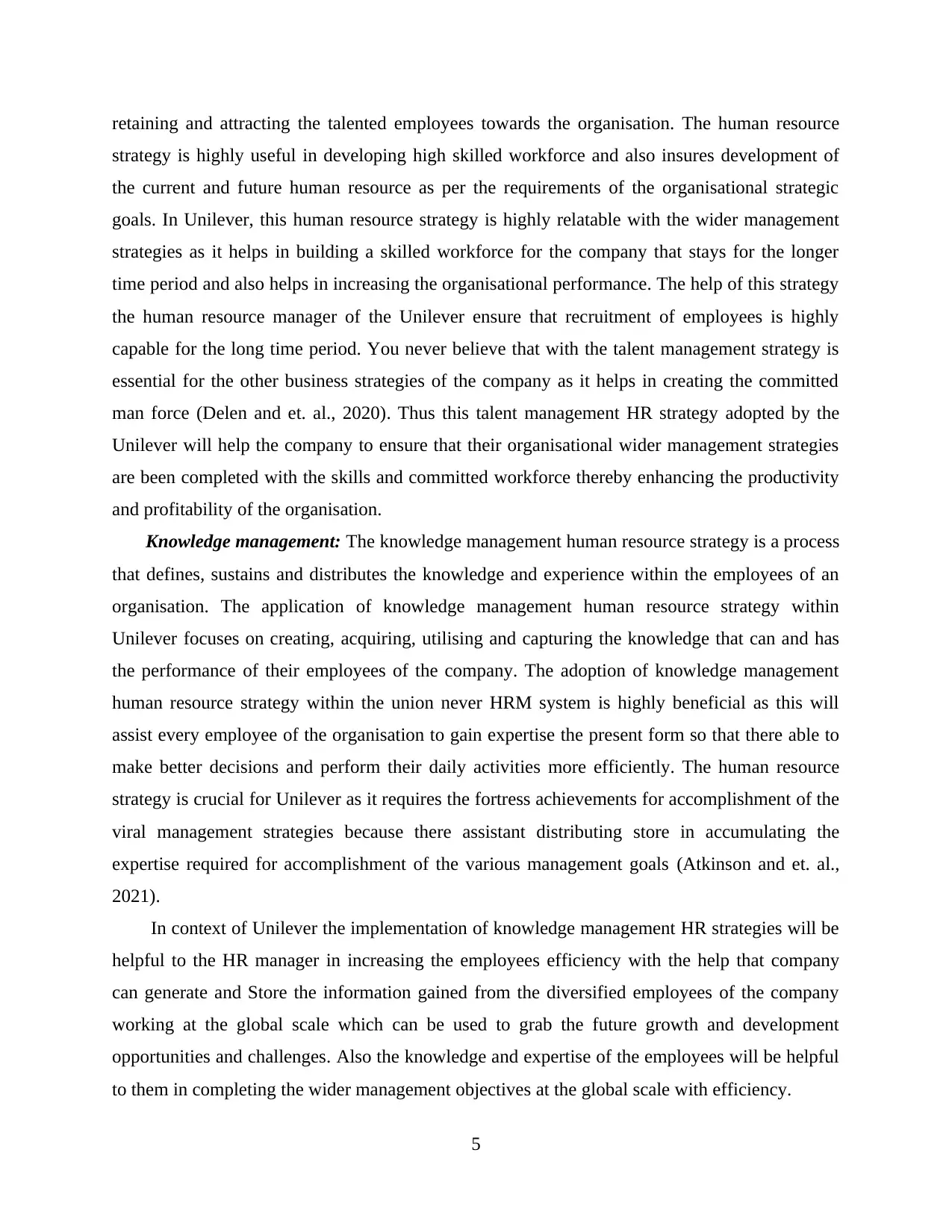
retaining and attracting the talented employees towards the organisation. The human resource
strategy is highly useful in developing high skilled workforce and also insures development of
the current and future human resource as per the requirements of the organisational strategic
goals. In Unilever, this human resource strategy is highly relatable with the wider management
strategies as it helps in building a skilled workforce for the company that stays for the longer
time period and also helps in increasing the organisational performance. The help of this strategy
the human resource manager of the Unilever ensure that recruitment of employees is highly
capable for the long time period. You never believe that with the talent management strategy is
essential for the other business strategies of the company as it helps in creating the committed
man force (Delen and et. al., 2020). Thus this talent management HR strategy adopted by the
Unilever will help the company to ensure that their organisational wider management strategies
are been completed with the skills and committed workforce thereby enhancing the productivity
and profitability of the organisation.
Knowledge management: The knowledge management human resource strategy is a process
that defines, sustains and distributes the knowledge and experience within the employees of an
organisation. The application of knowledge management human resource strategy within
Unilever focuses on creating, acquiring, utilising and capturing the knowledge that can and has
the performance of their employees of the company. The adoption of knowledge management
human resource strategy within the union never HRM system is highly beneficial as this will
assist every employee of the organisation to gain expertise the present form so that there able to
make better decisions and perform their daily activities more efficiently. The human resource
strategy is crucial for Unilever as it requires the fortress achievements for accomplishment of the
viral management strategies because there assistant distributing store in accumulating the
expertise required for accomplishment of the various management goals (Atkinson and et. al.,
2021).
In context of Unilever the implementation of knowledge management HR strategies will be
helpful to the HR manager in increasing the employees efficiency with the help that company
can generate and Store the information gained from the diversified employees of the company
working at the global scale which can be used to grab the future growth and development
opportunities and challenges. Also the knowledge and expertise of the employees will be helpful
to them in completing the wider management objectives at the global scale with efficiency.
5
strategy is highly useful in developing high skilled workforce and also insures development of
the current and future human resource as per the requirements of the organisational strategic
goals. In Unilever, this human resource strategy is highly relatable with the wider management
strategies as it helps in building a skilled workforce for the company that stays for the longer
time period and also helps in increasing the organisational performance. The help of this strategy
the human resource manager of the Unilever ensure that recruitment of employees is highly
capable for the long time period. You never believe that with the talent management strategy is
essential for the other business strategies of the company as it helps in creating the committed
man force (Delen and et. al., 2020). Thus this talent management HR strategy adopted by the
Unilever will help the company to ensure that their organisational wider management strategies
are been completed with the skills and committed workforce thereby enhancing the productivity
and profitability of the organisation.
Knowledge management: The knowledge management human resource strategy is a process
that defines, sustains and distributes the knowledge and experience within the employees of an
organisation. The application of knowledge management human resource strategy within
Unilever focuses on creating, acquiring, utilising and capturing the knowledge that can and has
the performance of their employees of the company. The adoption of knowledge management
human resource strategy within the union never HRM system is highly beneficial as this will
assist every employee of the organisation to gain expertise the present form so that there able to
make better decisions and perform their daily activities more efficiently. The human resource
strategy is crucial for Unilever as it requires the fortress achievements for accomplishment of the
viral management strategies because there assistant distributing store in accumulating the
expertise required for accomplishment of the various management goals (Atkinson and et. al.,
2021).
In context of Unilever the implementation of knowledge management HR strategies will be
helpful to the HR manager in increasing the employees efficiency with the help that company
can generate and Store the information gained from the diversified employees of the company
working at the global scale which can be used to grab the future growth and development
opportunities and challenges. Also the knowledge and expertise of the employees will be helpful
to them in completing the wider management objectives at the global scale with efficiency.
5
Paraphrase This Document
Need a fresh take? Get an instant paraphrase of this document with our AI Paraphraser
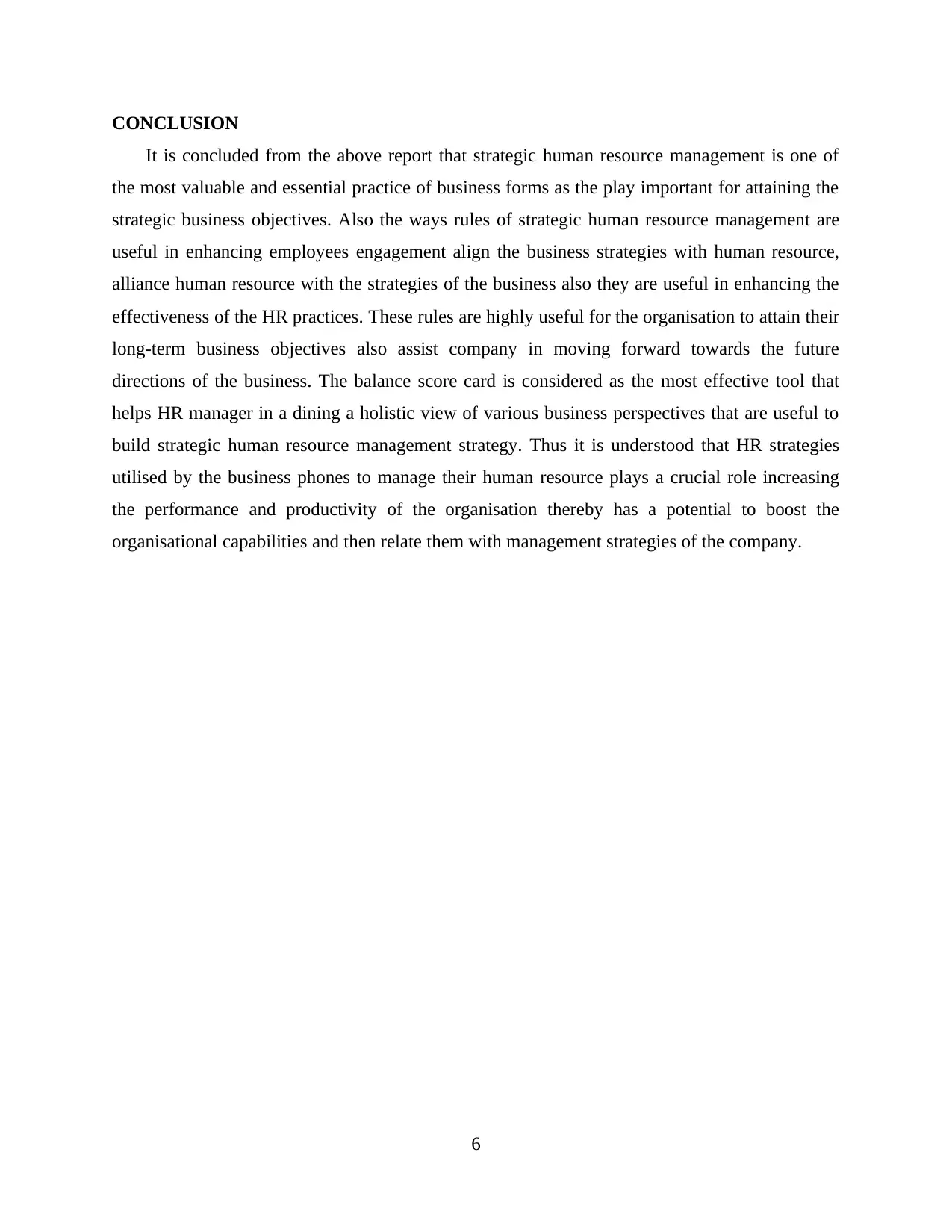
CONCLUSION
It is concluded from the above report that strategic human resource management is one of
the most valuable and essential practice of business forms as the play important for attaining the
strategic business objectives. Also the ways rules of strategic human resource management are
useful in enhancing employees engagement align the business strategies with human resource,
alliance human resource with the strategies of the business also they are useful in enhancing the
effectiveness of the HR practices. These rules are highly useful for the organisation to attain their
long-term business objectives also assist company in moving forward towards the future
directions of the business. The balance score card is considered as the most effective tool that
helps HR manager in a dining a holistic view of various business perspectives that are useful to
build strategic human resource management strategy. Thus it is understood that HR strategies
utilised by the business phones to manage their human resource plays a crucial role increasing
the performance and productivity of the organisation thereby has a potential to boost the
organisational capabilities and then relate them with management strategies of the company.
6
It is concluded from the above report that strategic human resource management is one of
the most valuable and essential practice of business forms as the play important for attaining the
strategic business objectives. Also the ways rules of strategic human resource management are
useful in enhancing employees engagement align the business strategies with human resource,
alliance human resource with the strategies of the business also they are useful in enhancing the
effectiveness of the HR practices. These rules are highly useful for the organisation to attain their
long-term business objectives also assist company in moving forward towards the future
directions of the business. The balance score card is considered as the most effective tool that
helps HR manager in a dining a holistic view of various business perspectives that are useful to
build strategic human resource management strategy. Thus it is understood that HR strategies
utilised by the business phones to manage their human resource plays a crucial role increasing
the performance and productivity of the organisation thereby has a potential to boost the
organisational capabilities and then relate them with management strategies of the company.
6
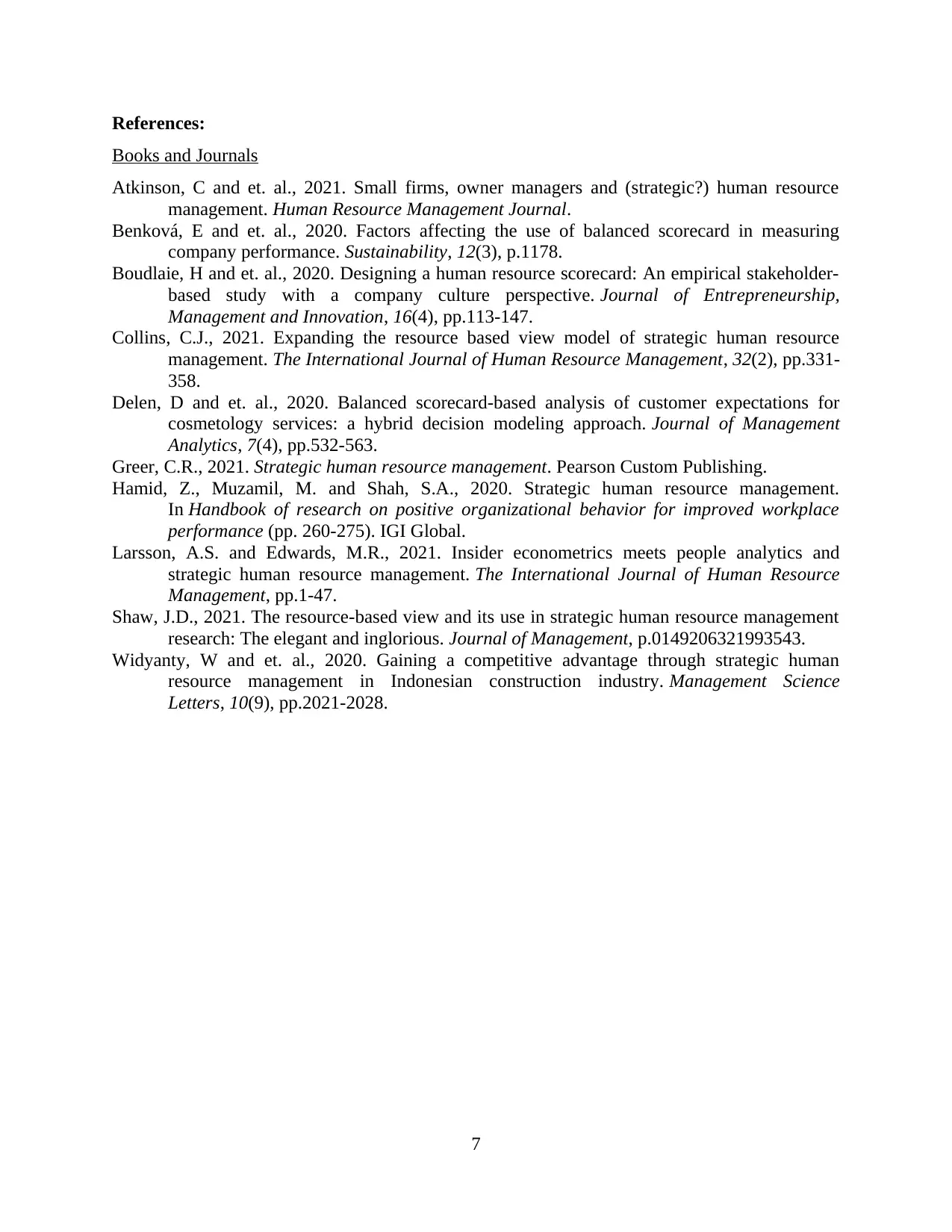
References:
Books and Journals
Atkinson, C and et. al., 2021. Small firms, owner managers and (strategic?) human resource
management. Human Resource Management Journal.
Benková, E and et. al., 2020. Factors affecting the use of balanced scorecard in measuring
company performance. Sustainability, 12(3), p.1178.
Boudlaie, H and et. al., 2020. Designing a human resource scorecard: An empirical stakeholder-
based study with a company culture perspective. Journal of Entrepreneurship,
Management and Innovation, 16(4), pp.113-147.
Collins, C.J., 2021. Expanding the resource based view model of strategic human resource
management. The International Journal of Human Resource Management, 32(2), pp.331-
358.
Delen, D and et. al., 2020. Balanced scorecard-based analysis of customer expectations for
cosmetology services: a hybrid decision modeling approach. Journal of Management
Analytics, 7(4), pp.532-563.
Greer, C.R., 2021. Strategic human resource management. Pearson Custom Publishing.
Hamid, Z., Muzamil, M. and Shah, S.A., 2020. Strategic human resource management.
In Handbook of research on positive organizational behavior for improved workplace
performance (pp. 260-275). IGI Global.
Larsson, A.S. and Edwards, M.R., 2021. Insider econometrics meets people analytics and
strategic human resource management. The International Journal of Human Resource
Management, pp.1-47.
Shaw, J.D., 2021. The resource-based view and its use in strategic human resource management
research: The elegant and inglorious. Journal of Management, p.0149206321993543.
Widyanty, W and et. al., 2020. Gaining a competitive advantage through strategic human
resource management in Indonesian construction industry. Management Science
Letters, 10(9), pp.2021-2028.
7
Books and Journals
Atkinson, C and et. al., 2021. Small firms, owner managers and (strategic?) human resource
management. Human Resource Management Journal.
Benková, E and et. al., 2020. Factors affecting the use of balanced scorecard in measuring
company performance. Sustainability, 12(3), p.1178.
Boudlaie, H and et. al., 2020. Designing a human resource scorecard: An empirical stakeholder-
based study with a company culture perspective. Journal of Entrepreneurship,
Management and Innovation, 16(4), pp.113-147.
Collins, C.J., 2021. Expanding the resource based view model of strategic human resource
management. The International Journal of Human Resource Management, 32(2), pp.331-
358.
Delen, D and et. al., 2020. Balanced scorecard-based analysis of customer expectations for
cosmetology services: a hybrid decision modeling approach. Journal of Management
Analytics, 7(4), pp.532-563.
Greer, C.R., 2021. Strategic human resource management. Pearson Custom Publishing.
Hamid, Z., Muzamil, M. and Shah, S.A., 2020. Strategic human resource management.
In Handbook of research on positive organizational behavior for improved workplace
performance (pp. 260-275). IGI Global.
Larsson, A.S. and Edwards, M.R., 2021. Insider econometrics meets people analytics and
strategic human resource management. The International Journal of Human Resource
Management, pp.1-47.
Shaw, J.D., 2021. The resource-based view and its use in strategic human resource management
research: The elegant and inglorious. Journal of Management, p.0149206321993543.
Widyanty, W and et. al., 2020. Gaining a competitive advantage through strategic human
resource management in Indonesian construction industry. Management Science
Letters, 10(9), pp.2021-2028.
7
⊘ This is a preview!⊘
Do you want full access?
Subscribe today to unlock all pages.

Trusted by 1+ million students worldwide
1 out of 9
Related Documents
Your All-in-One AI-Powered Toolkit for Academic Success.
+13062052269
info@desklib.com
Available 24*7 on WhatsApp / Email
![[object Object]](/_next/static/media/star-bottom.7253800d.svg)
Unlock your academic potential
Copyright © 2020–2025 A2Z Services. All Rights Reserved. Developed and managed by ZUCOL.

